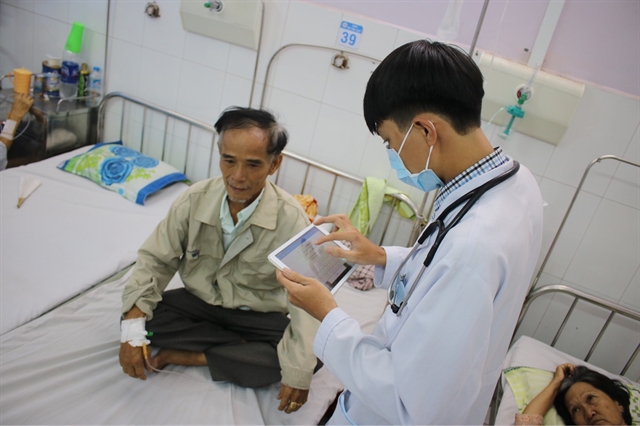 Society
Society

Professor Trần Quý Tường, director general of the Agency of Information Technology at the Ministry of Health, talks to VietTimes about the use of electronic health records.

|
| A doctor in Thủ Đức District, HCM City, checks the electronic medical records of a patient. — VNA/VNS Photo Đinh Hằng |
Professor Trần Quý Tường, director general of the Agency of Information Technology at the Ministry of Health, talks to VietTimes about the use of electronic health records.
When was the idea of compiling a database of medical records introduced?
The idea of building a comprehensive database of electronic medical records has been nurtured for many years. Deputy Prime Minister Vũ Đức Đam has instructed the Ministry of Health to speed up the development of a database for all Vietnamese citizens from birth until death.
Resolution 20 of the Party Central Committee, which was signed on October 25, 2017, emphasized the need to strengthen healthcare and protection for all Vietnamese citizens both physically and spiritually. It also sets a goal that by 2030, 95 per cent of the Vietnamese population will have electronic healthcare records; 100 per cent of commune/ward healthcare centres will be able to perform their assigned tasks relating to preventive healthcare; and 100 per cent of communes nationwide will have primary healthcare centres.
The resolution also sets a clear target that by 2025, 95 per cent of Vietnamese people will have E Health Books.
Can you talk a bit further about the significance of the development of E Health Books?
Each Vietnamese citizen will be given an E Health Book which they will keep for life. The books will give doctors comprehensive knowledge about their patients when they seek medical help. More importantly the E Health Books will help modernise the national health service, particularly in the context of the 4th Industrial Revolution.
The agency launched new software on June 14 designed to compile a comprehensive database of electronic medical records.
The MOH plans to trial the software in eight provinces and cities before expanding the system nationwide in July next year. The aim is to have complete medical records available at the touch of a button for every citizen.
Can you share with us some of the advantages of electronic health records in the context of the current COVID-19 pandemic in Việt Nam?
Electronic health records will help medical staff monitor people's health, particularly the elderly and people with serious diseases as they are vulnerable to the SARS-COV2 virus. Effectively monitoring these groups of people will help them to avoid catching these diseases, and reduce the fatality rate from COVID-19.
Acknowledging the importance of providing good healthcare for the elderly, particularly those with chronic diseases, Deputy Prime Minister Vũ Đức Đam has given instructions to localities nationwide to launch a campaign to build electronic health records for all Vietnamese citizens.
According to the Ministry of Health, Việt Nam has already established 1,000 telehealth points between big hospitals nationwide, including clinics in remote mountainous regions and islands. Thanks to the operation of these telehealth points, patients living offshore or in remote mountainous regions can receive the care they need.
Have there been any challenges in the course of rolling out online and telehealth checks?
Thanks to good technical infrastructure, most communal health centres are connected to provincial or central city centres. This is an essential tool for online and telehealth checks. According to the Ministry of Health, online and telehealth checks are now inter-connected nationwide.
Were you happy to hear your agency had been named for the Việt Nam Digital Awards 2020?
As the director general of the Agency of Information Technology under the Ministry of Health, I was very happy to hear the news. The award encourages us to continue to expand the system nationwide. The aim is to have comprehensive medical records available at the touch of a button for every Vietnamese citizen in accordance with the Prime Minister’s Decision No.749 which was signed on June 3, 2020. — VNS




